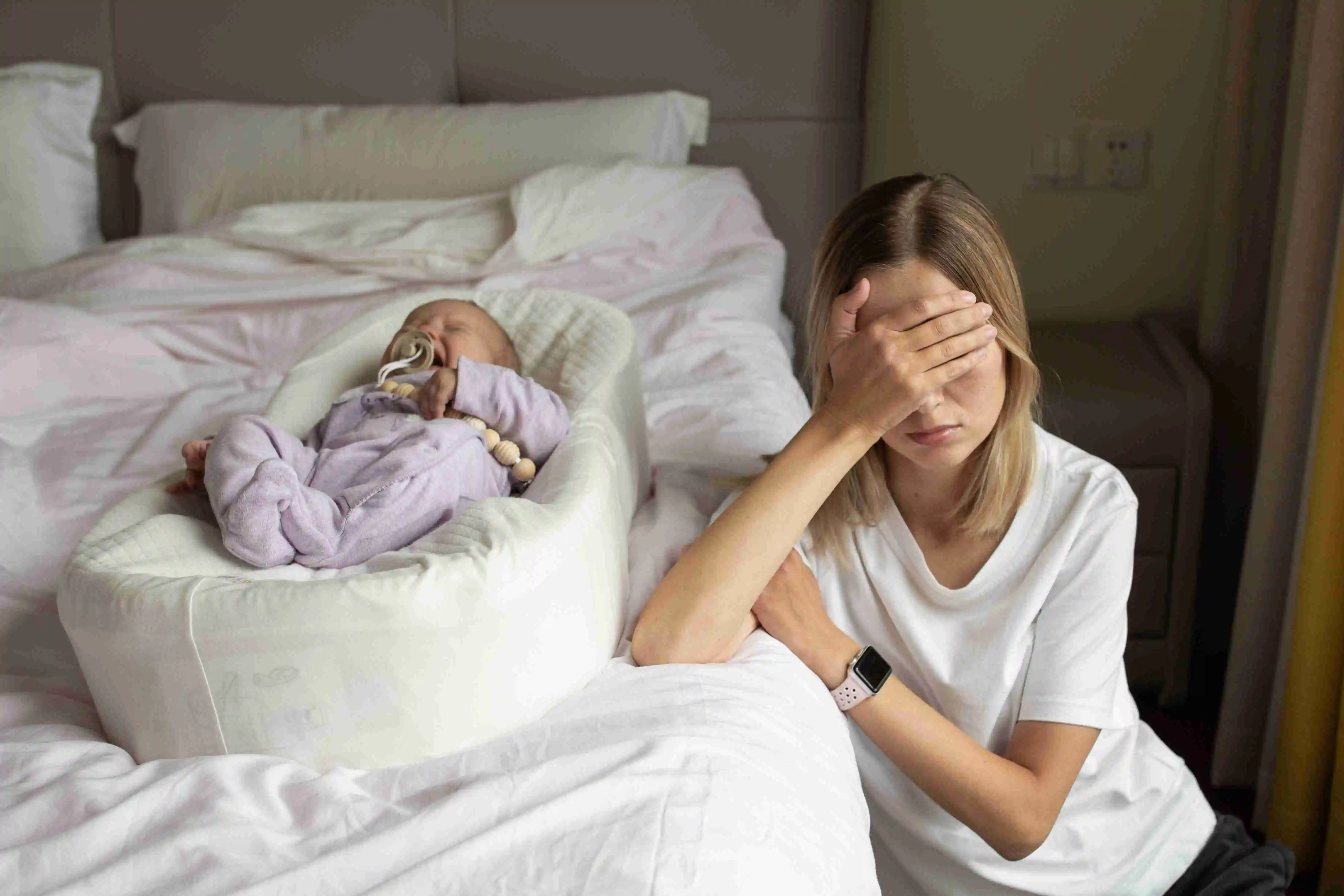
Sleep is essential for the overall health and well-being of babies. It plays a crucial role in their growth, development, and cognitive function. Adequate sleep promotes healthy brain development and strengthens the immune system. It also helps in regulating mood and emotions, improving attention span, and enhancing learning abilities.
Lack of sleep can lead to various issues, such as irritability, difficulty concentrating, and decreased immune function. Therefore, parents must understand the importance of providing a conducive sleep environment and establishing healthy sleep habits for their babies.
Benefits of Sleep for Babies
If your baby's sleeping habits are healthy, there are many benefits to sleep for babies, from strengthening their immune system and reducing the risk of illness to healthy brain and cognitive function development.
Healthy Development
Sleep plays a crucial role in the healthy development of babies. It is during sleep that their bodies and brains undergo significant growth and repair processes. Adequate sleep promotes physical and cognitive development, allowing babies to reach their milestones and develop new skills.
Brain Development
Adequate sleep is critical for babies' healthy development, especially when it comes to their brain development. During sleep, the brain processes information, forms connections, and consolidates memories, all of which are essential for cognitive growth.
Promotes Growth
When babies sleep, their bodies release growth hormones that help promote overall growth, including the development of bones and muscles.
Strengthen the Immune System
Lack of sleep can weaken the immune system, making babies more susceptible to illnesses and infections. Therefore, providing a conducive sleep environment and establishing a regular sleep routine can help strengthen the immune system of babies.
Regenerate Cells
During sleep, the body goes into repair mode, and this is especially important for babies because they are constantly growing and developing. As part of that repair mode, the body allows cells to regenerate, which helps in the proper functioning of various systems in their bodies.
How much sleep do babies need?
Babies need more sleep than adults, as it plays a vital role in their growth, mental development, and cognitive functions. However, not all babies require the same amount of sleep; babies in different stages of their first year might have slightly different sleep requirements.
0 to 4 Months
Newborns require a significant amount of sleep. On average, so newborn sleep schedule will include around 14 to 17 hours of sleep per day.
However, this amount can vary from baby to baby. Some may sleep for longer stretches, while others may have more frequent but shorter naps.
4 to 6 Months
As babies enter the 4–6-month range, their sleep needs start to change. At this stage, babies generally need around 12 to 16 hours of sleep per day. They may still take multiple naps during the day, but their nighttime sleep tends to become more consolidated.
6 to 12 Months
From 6 to 12 months, babies continue to require a similar amount of sleep as they did in the previous stage, approximately 12 to 16 hours per day. However, their daytime naps may start to consolidate into two longer naps instead of multiple shorter ones.
If you want to know more about the relationship between children and teens and sleep, check out these articles “Children & Sleep” and “Teens & Sleep”.
What prevents babies from sleeping at night?

Unlike adults, babies tend to wake up multiple times during the night, and this comes down to several reasons, such as being uncomfortable, hungry, or other reasons that might decrease the quality of their sleep.
Parents must understand what causes their baby to wake up so they can address that issue and improve the overall quality of their baby’s sleep.
Undeveloped Circadian Rhythm
Due to their younger age, babies' circadian rhythm, or the internal clock that regulates their waking and sleeping hours, is underdeveloped, which makes their sleeping and waking up habits very inconsistent and overtly dependent on the circumstances surrounding their sleeping environment.
For example, they may prefer to sleep with their parents outside of the house, which means they are likely to experience more disturbances than when they sleep at home.
Hunger
Babies have small stomachs, and their nutritional needs are higher than those of adults. Therefore, they may wake up at night to feed, especially during growth spurts.
Wet or Dirty Diaper
A wet or dirty diaper can cause discomfort and disrupt a baby's sleep. It is important for parents to regularly check and change their baby's diaper before putting them to bed.
Discomfort
Babies may experience discomfort due to issues such as teething, diaper rash, or illness that disrupt their sleep. Additionally, babies are still learning to self-soothe and may rely on their parents or caregivers to help them fall back asleep when they wake up during the night.
Illness
Common illnesses such as colds or ear infections can cause discomfort and make it difficult for babies to sleep soundly, so parents need to monitor their baby's health and seek medical attention if necessary to address any underlying illnesses that may be affecting their sleep.
High Sensitivity
Noise, light, or temperature changes can easily disturb babies, who are highly sensitive to their environment. These external factors can interrupt their sleep and prevent them from getting the rest they need.
What is sleep regression?
Sleep regression in babies refers to a temporary disruption in a baby's sleep patterns. It is a phase where a previously good sleeper suddenly starts experiencing difficulties falling asleep or staying asleep, which are some of the signs of sleep regression.
This can be quite challenging for parents, as they may find themselves dealing with frequent night wakings and difficulty getting their baby to settle down for naps or bedtime.
Triggers of Sleep Regressions
If your baby was having no trouble during his sleeping sessions but suddenly started struggling to fall and stay asleep during the night, then he might be suffering from sleep regression, here are some of the most common triggers of sleep regression.
Developmental Milestones
Developmental milestones are one of the main causes of infant sleep regression. As babies grow and develop, they go through various stages, such as rolling over, crawling, and walking. These milestones can disrupt their sleep patterns, as they become more active during the day and may struggle to settle down at night.
- Solution: Parents need to recognize these milestones and adjust their sleep routines accordingly, providing extra comfort and reassurance during this time.
Teething
The discomfort and pain associated with teething can disrupt a child's sleep patterns, causing them to wake up more frequently during the night. This can be a frustrating time for parents, as they may have previously established a solid sleep routine for their child.
- Solution: It's important to remember that this is a temporary phase and that the child's sleep patterns will eventually return to normal once the teething process is complete.
Changes in Routine or Environment
Young children thrive on routine and predictability, so any significant changes in their daily schedule can disrupt their sleep patterns. This can include changes such as starting daycare or preschool, traveling to a different time zone, or even moving to a new house. These disruptions can lead to temporary sleep regressions as the child adjusts to their new routine.
- Solution: During these times, it's important for parents to maintain consistency as much as possible and provide reassurance and comfort to their child. Gradually, as the child becomes more familiar with the new routine, their sleep patterns will stabilize once again.
Overstimulation
Overstimulation occurs when a baby is exposed to too much sensory input, such as loud noises, bright lights, or excessive playtime, which can make it difficult for them to relax and fall asleep, This can lead to disrupted sleep patterns and frequent awakenings throughout the night.
- Solution: To mitigate the overstimulation effect, parents can create a calm and soothing environment for the baby, which can be achieved by dimming the lights, reducing noise levels, and maintaining a consistent bedtime routine.
Separation Anxiety
As babies become more aware of their surroundings and form attachments to their caregivers, they may develop anxiety when separated from them, particularly at bedtime. This can result in crying, resistance to sleep, and increased nighttime waking.
- Solution: Establishing a consistent bedtime routine can provide a sense of security and comfort for the baby. Gradual separation techniques, such as practicing short periods of separation during the day, can help them become more comfortable with being away from their parents.
Sleep Associations
If a baby relies on external factors, such as being rocked or nursed to sleep, they may have difficulty self-soothing and resettling during the night when they wake up naturally.
- Solution: Parents should slowly and gradually reduce their baby’s reliance on the association over time. This allows the baby to develop independent sleep skills.
Illness or Allergies
When a child is ill or experiencing allergy symptoms, it can interfere with their ability to sleep soundly through the night. Common symptoms such as congestion, coughing, or itching can cause discomfort and make it difficult for the child to fall asleep or stay asleep.
- Solution: In these cases, parents need to address the underlying cause of the sleep regression by managing the child's allergies or treating their illness. By doing so, they can help restore their child's normal sleep patterns.
Tips To Make Your Baby Fall Asleep

If you’re struggling to make your baby sleep through the night, even though it might be a challenging thing, there are so many ways to help your baby relax and get ready for bedtime. Here are a few ways to make your baby fall asleep faster:
Active Play During the Day
One important tip is to ensure that your baby engages in active play during the day. This helps them expend their energy and promotes better sleep at night.
Engaging in activities such as crawling, and playing with toys can help tire them out and make them more likely to fall asleep easily.
Feed Your Baby Well During the Day
Hunger is one of the main reasons that keeps the baby from falling asleep, so it’s essential to make sure that your baby isn’t hungry before putting him to sleep. However, it's also important to make sure that the baby doesn’t fall asleep right after eating, as this might cause irritation and indigestion.
Burp Your Baby
Another important tip that will improve the quality of your baby's sleep is to burp it after feedings. This helps release any trapped air in their stomach, which can cause discomfort and make it difficult for them to fall asleep. Gently patting or rubbing their back in an upright position can help facilitate the burping process.
Give your Baby a Bath
Taking a bath right before bed can be beneficial for babies as well as adults, as it promotes the production of the melatonin hormone, which is responsible for relaxing the body and preparing it for sleep.
Maintain your Baby’s Hygiene
Maintaining your baby's hygiene is an essential factor in helping them fall asleep. A clean and comfortable environment promotes relaxation and can contribute to better sleep. Regularly changing their diapers, cleaning their face and hands, and ensuring that their sleepwear is fresh and cozy, which contributes to sleep hygiene, can make a significant difference in their sleep quality.
Dim the Lights
Babies are more sensitive to the surrounding environment than adults, so dimming the lights helps minimize the distraction that keeps them from falling asleep; it also sets the tone for them to sleep.
Read a Book for your Baby
Reading a book can be a soothing activity that can help your baby fall asleep, as the calming rhythm of your voice and the gentle storyline can create a sense of relaxation and comfort for your little one.
Sing a Lullaby for your Baby
It’s important to understand that babies can’t self-soothe, which means that they rely completely on their parents to soothe them and lull them to sleep, and one of the best ways to do that is to sing a lullaby for your baby.
Swaddle your Baby
Swaddling involves wrapping your baby snugly in a blanket, mimicking the feeling of being in the womb. This can help soothe and calm your baby, making them feel secure and more likely to drift off to sleep.
Use White Noise
Using white noises, which you can play on your phone, can help soothe your baby, help them relax, and get their brain ready to fall asleep.
Use Pacifiers for Comfort
Pacifiers can provide a sense of security and help soothe your baby, making it easier for them to drift off to sleep.
It is important to choose a pacifier that is age-appropriate and safe for your baby. Additionally, make sure to clean the pacifier regularly and replace it if it becomes worn or damaged.
Make Sure the Temperature is Suitable
If it’s too hot or too cold, your baby will have a hard time falling asleep, especially since babies are more sensitive to temperature, so it’s crucial to make sure that the room temperature is suitable for the baby to sleep without any disruption.
Create a Quiet Environment
Babies are very light sleepers, and they are very hyper-aware of their surroundings while they’re asleep. While it can be hard to always create a quiet environment for babies, as their sleep patterns are unpredictable, as a parent, you have to try as much as possible to create a suitable environment and limit sleep disruptions for them to get as much sleep as possible.
FAQs
Why do babies wake up frequently?
Babies often wake up during the night for a variety of reasons. For instance, they may wake up due to hunger or discomfort, and due to their shorter sleep cycles than adults, they tend to transition between light and deep sleep more frequently. This can cause them to wake up more frequently throughout the night.
What happens if my baby doesn’t get enough sleep?
Insufficient sleep can lead to irritability and fussiness, making it difficult for the baby to stay content and cheerful during waking hours. Lack of sleep can also affect their cognitive functioning, impairing their ability to learn and retain information. Additionally, inadequate sleep can weaken their immune system, making them more susceptible to illnesses and infections.
How do I know if my baby is getting an adequate amount of sleep?
There are a few signs that can indicate if your baby is getting an adequate amount of sleep, as a well-rested baby will wake up feeling refreshed and alert rather than fussy or cranky. They will also have a regular sleep schedule, with consistent nap times and bedtimes.
What should I do if my baby isn’t sleeping well?
Establish a consistent bedtime routine that includes activities such as a warm bath, reading a bedtime story, or gentle rocking. This routine will signal to your baby that it is time to wind down and prepare for sleep.
At what age do babies start sleeping well?
While some babies may start sleeping well at around 3 to 4 months, others may take longer to establish a consistent sleep routine. It is important to remember that each baby is different, and there is no one-size-fits-all answer to when they will start sleeping well. However, by the age of 6 months, most babies are capable of sleeping for longer stretches at night without waking up for feedings.
What milestones affect baby sleep?
The transition from swaddling to sleeping without a tight wrap is one milestone that affects baby sleep. This transition can disrupt their sleep as they adjust to the new sensation of sleeping without being tightly wrapped. Teething can cause discomfort and pain, making it difficult for babies to fall asleep or stay asleep throughout the night.
How long does sleep regression last?
The duration of sleep regression can vary from child to child, but it typically lasts for a few weeks to a couple of months.
Why do babies go through sleep regression?
One common cause is developmental changes. As babies grow, babies sleep patterns and needs change, and this can disrupt their usual sleep routine. Another reason could be teething, as the discomfort can make it difficult for babies to settle down and fall asleep. Additionally, illness or growth spurts can also lead to sleep regression.
Conclusion
Quality sleep is critical for babies' overall well-being. When babies get sufficient sleep, they are more likely to be alert, happy, and have a good appetite throughout the day. On the other hand, a lack of sleep can lead to irritability, fussiness, and feeding difficulties. It can also affect their mood and behaviour, making them more prone to tantrums and meltdowns.
By ensuring that babies get enough restful sleep, parents can help promote their emotional well-being and create a more peaceful and harmonious environment for both baby and parent.
Karen Barnard
Karen is a Human Movement Science expert and a certified sports nutrition and massage therapist. At Sleepiverse, she combines her passion for human movement science and sleep health to educate herself and her readers about healthier sleep. In addition to writing articles, Karen manages a fitness studio offering private training, athletic conditioning, and sports massage therapy. She focuses on providing people with a holistic environment for people to reach their health goals, often incorporating stretch therapy to promote mental tranquillity and help people improve their sleep.


